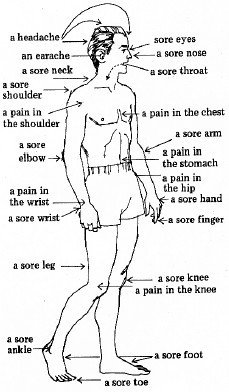(单词翻译:单击)
PROGRAMME 25
第一部分对话:看病
这是医生和病人的一段对话。
Dialogue 1
英语情景对话1
DOCTOR: Well, what's wrong?
PATIENT: A bad cold,I think…(咳嗽)
DOCT OR: Hmm.Got a bit of a cough?
PATIENT: Yes.
DOCTOR: Is your throat sore?
PATIENT: Yes.
DOCTOR: Let's have a look at it. Hmm. Say ah.
PATIENT: A-a-a-h.
DOCTOR: Have you taken anything for it?
PATIENT: Yes. Hot lemon drinks.
DOCTOR: Uh-huh. Let's check your temperature. Hmm. Yes. How's your head.
PATIENT: Well... I've got a bit of a headache.
DOCTOR: Hmm. Is your nose blocked?
PATIENT: Yes.
DOCTOR: Uh-huh. I see.
第二部分:英语词汇表达
常见的病症
a bad back 背疼;腰疼
a bit of a cold 轻微的感冒
a cough 咳嗽
an earache 耳朵疼
a headache 头瘘
a pain in the stomach 胃疼;肚子疼
a sore throat 嗓子疼
a stomach-ache 胃疼;肚子疼
a toothache 牙疼
Uh-huh (这足一个非常口语化的说法,相当于汉语里的“嗯”)
其他有关健康的词语
an aspirin 阿司匹林(既用作可数名词,也用作不可数名词)
a hot lemon drink 一杯热柠檬汁
the flu 流行性感冒
Excuse me 对不起(打月贲嚏以后这样说,向周围的人表示歉意)
Have you taken anything for it? 吃过什么药吗?
I feel a bit off colour 我感觉不大舒服
Is your nose blocked? 鼻子通不通?
It'll probably clear up in a few days 这几天可能就好了
Let's check your temperature 给你量量体温吧
Not the best 有点儿不舒服
Say Ah 说“啊”(医生要看嗓子)
something for your throat 治嗓子的约
What's wrong/the matter? 怎么啦?
You don't look a hundred percent 你看上去不大舒服
You don't look the best 你好象不大舒服
IDIOM:
A pain in the neck 令人讨厌的人或事
第三部分:课程
TALKING ABOUT OUR HEALTH怎样谈论健康
1. GREETINGS+ENQUIRIES ABOUT HEALTH 打招呼与询问健康
我们在打招呼的时候,通常都要询问对方的健康。例如:
Hello! How're you?
How're you?是用来打招呼的一句话,
但它同时也足一句询问健康的话。这句话需要回答,最常见的说法是:
Hello, how're you?
- Finer
How're you?
- Not bad.
听到这种既是打招呼又是问好的话,在同答的时候,一般不详细说明自己的健康状况如何。但是如果的确身体不好,也可以说:
How're you?
- Not the best, actually.
2. FINDING OUT WHAT'S WRONG 询问对方身体怎么不好
了解到对方身体不好以后,便可进一步询问细节。例如:
JOHN:How're you?
BARBARA:Not the best,actually.
JOHN:Oh? What's the matter?
BARBARA: I've got a bit of a cold.
3. COMMENTING ON SOMEONE'S HEALTH/ APPEARANCE评论某人的健康或气色
我们通常是在听到对方说不舒服以后才评论他的气色。例如:
BARBARA:I've got a bit of a cold.
JOHN:Mmm…you don't look a hundred percent.
然而,如果一个熟人好象病了,我们为了表示关心,也可以先说。例如:
JOHN:Hullo, Barbara. You don't look the best. What's wrong?
BARBARA:I've got a bad back, I'm afraid.
JOHN:That's too bad. Perhaps you should see the doctor.
4. ENQUIRIES ABOUT A SICK PERSON问候病人
如果我们知道某人病了,就可以给他打电话,或者亲自新去问候。一般可以这样说:
How're you today?
I'm feeling better.
How're you getting on?
I still feel a bit off colour.
Are you feeling better now?
Yes. a bit.
5. TALKING OF OUR AILMENTS自已有病
说自己有什么病,最常用的说法是:
I've got+病名。例如:
I've got a headache.
I've got a sore throat.
注意:
我们可以说I've got a toothache,也可以说I've got toothache, 可以说I've got an earache,也可以说I've got earache,但只能说I've got a headache,只能说I've got a stomach-ache,最后两句一定要用冠词。
The flu是influenza的简略说法。在influenza前面不用冠词。例如:I've got influenza.我们说I've got a bit of a cold.意思是感冒不历害。然而有时我们故意用a bit这个短语来把严重的情况说得不那么严重。
例如:
JOHN:You look awful!Are you O.K.?
BARBARA: No, I'm not. I'm a bit off colour!
JOHN: What's the matter?
BARBARA: I've got a headache and an earache. And a sore throat and bit of a cough.
JOHN: You certainly are a bit off colour!
(请朗读这段对话,注意读音。)
第四部分:背景资料
人体某些部位疼痛示意图。

注意:
sore一般指身体表面的疼痛,而pain和ache指体内的。因此,a sore ear指耳朵外部疼,而(an) earache 指耳朵里面疼。


